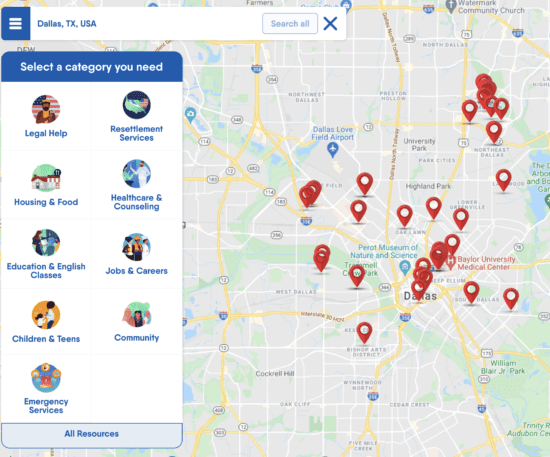Housing in the U.S.
In the United States, there is not enough available housing. This has caused the cost of housing to go up and be more expensive. It is called a “housing crisis.”
New immigrants and refugees may have a hard time finding an affordable place to live. It may take some time and you may not get exactly what you want in a home. It is important to know all of your options.
Short-term housing
Short-term housing is a place where you live temporarily. It is for a short time, usually for a few days or months. Options for this may include a:
- Hotel
- Shared apartment or house
- Homeless shelter
- Transitional housing
Homeless shelter
Homeless shelters offer a temporary place to sleep. Most shelters are free and offer meals. Shelters often try to keep families together but generally have separate sleeping areas for men and women. They have rules you must follow, such as some might have a curfew or limits on what you can bring.
Transitional housing
Transitional housing helps people move from homelessness to a permanent home by providing a place to stay for a longer time. It can be free or low-cost. It may include other support like job training and help finding a stable home.
| Your immigration status should not affect whether you can stay at a homeless shelter or transitional housing. |
Rent a home
Many people rent apartments or houses in the United States. You can rent a place from a private owner or a property management company.
You will most likely have to:
- Fill out an application that asks about your income, work, and past rentals. It also asks for your social security number to check your background and credit.
- Sign a lease agreement if your application is approved. This is a legal contract between the tenant and landlord. You agree to the dates of the rental, cost, and conditions. Leases are usually for one year.
- Pay a security deposit and the first month’s rent.
- Pay rent monthly as well as utilities, such as electricity.
A tenant is a person who is renting a home. A landlord is a person who rents the home to the tenant.
Before you start looking for a place to rent, make sure you know how much you can afford to pay. Generally, it is best to pay around 30% of the amount of money you make a month.
Tips for getting a home to rent
If you have trouble being approved for a rental, you can have someone cosign for you or find a roommate who can apply with you.
If you cannot afford a place to live, Public Housing Agencies (PHAs) are a good place to start. The U.S. government offers public or subsidized housing with lower rent. Housing vouchers can also help you pay rent. These housing benefits are available to:
- Refugees and asylees
- Humanitarian parolees
- Grantees of withholding of removal
If you are undocumented or have temporary immigration status, you are not eligible for these programs. You can still live with a family member who is in the program and has legal immigration status.
Sharing a rental with other people can also help you afford a place to live.
Buy a home
The majority of people in the United States own a home. Owning a home can help create stability and build wealth. You do not have to be a U.S. citizen to buy a home.
Many homeowners get a mortgage or loan to help buy a home. The U.S. Department of Housing and Urban Development (HUD) offers information about buying a home and counseling to help review your options. The Federal Housing Administration (FHA) and some states offer programs that provide loans with lower down payments and closing costs.
Find housing help
There are websites and places in your community that post available housing options. Check bulletin boards in your local community centers, libraries, and places of worship.
Some websites you can try include:
- Short-term housing: hotels.com, Airbnb
- Shared housing: Facebook marketplace, craigslist, roommates.com
- Rentals: Zillow, HotPads, RentCafe, 4stay, apartments.com
Utility help
There are programs that help people with low incomes pay for home utility bills, such as gas, electricity, phone, and internet.
- LIHEAP helps people with low incomes pay for home energy bills, such as gas and electricity. Contact the LIHEAP office in your state for more information.
- WAP helps pay for home improvements that save money on energy bills. Contact the WAP office in your state for more information.
- Lifeline helps people with low incomes pay for phone and internet service. Contact your phone or internet company to sign up for Lifeline service with them.
Government and non-profit support
Resource |
Offers |
|---|---|
Government resources for housing and rental assistance |
|
Free or low-cost advice on finding affordable housing across the USA |
|
A list of organizations helping people experiencing or at risk of homeless |
|
Help for people facing homelessness to find resources in their community |
|
Lower-cost housing for older adults, people with disabilities, and those with low income |
|
A list of affordable housing, public housing, and homeless resources by your location |
|
Resources for homeowners, homebuyers, and renters by state |
|
Housing support to Afghan evacuees |
|
Information for refugees looking for housing |
|
Help for refugees and asylees to find safe and affordable housing, set up their homes, and pay for rent and utilities |
|
Help for people in rural areas to find safe and affordable housing and repair their homes |
|
Help to find transitional housing by state |
|
Information on affordable housing, buying a home, and help for older adults and people with disabilities |
|
Resources that can help you pay for housing expenses and utility bills |
|
Housing and utility benefits such as loans and energy assistance in each state |
Know your rights
If you rent a home in the United States, you have certain tenant rights by law. These rights can vary from state to state.
- You have a right to live in a safe and healthy home. Your home should be free from issues like toxic mold, roof leaks, or pest infestations.
- Landlords and realtors cannot mistreat you based on your race, national origin, gender identity, sexual orientation, familial status, disability, or religion.
- If you have a disability, you can ask for reasonable changes in your rental home. Housing providers must accommodate people with disabilities.
- Landlords should give notice before entering your home. This is usually 24-48 hours before depending on your state.
- You do not have to answer questions about immigration status or religion. Landlords cannot ask you to show your immigration documents or harass you because of your religion.
- Not all rental and housing listings are real and safe. Learn how to identify housing scams.
- Find tips on ways to become a good tenant.
- Find more information on housing rights for immigrants.
| If you believe your housing rights have been violated, you can file a complaint with your local HUD office. |

Find legal help, English classes, health clinics, housing support, and more. Search a local map and list of services for immigrants in the USA with the app FindHello.
The information on this page comes from U.S. Department of Housing and Urban Development, USA.gov, Refugee Housing Solutions, and other trusted sources. We aim to offer easy to understand information that is updated regularly. This information is not legal advice.



